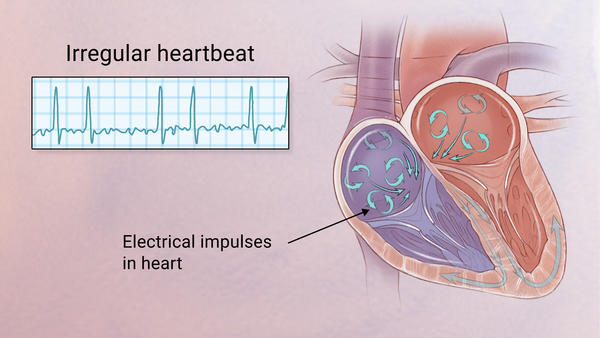
Atrial fibrillation/flutter (AF)
Atrial fibrillation/flutter is an arrhythmia with an irregularly irregular pulse. It may be paroxysmal (intermittent) or chronic (permanent).
The presence of atrial fibrillation/flutter often signals the presence of underlying heart disease, but not always. Studies have shown that chronic AF, even without other heart disease, carries an increased mortality risk. Clients with chronic AF may develop blood clots in the heart, which may lead to a stroke.
When AF is found, medication or electrical stimulation is used to convert the heart rhythm to normal (i.e., cardioversion). If cardioversion is successful, the client usually will continue on medication to keep the rhythm normal. If cardioversion is unsuccessful or if chronic AF develops, medication (or pacemaker) is used to control the heart rate, but the pulse remains irregular and a blood thinner is needed to decrease the risk of stroke.
Surgical intervention is often used to permanently prevent AF. The most common procedure is pulmonary vein isolation (PVI) wherein the site of electrical irregularity is ablated via catheter access into the heart.
Expectations:
| Condition | Rating |
| Paroxysmal with infrequent episodes and no underlying heart disease | No rating |
| Other paroxysmal of chronic with no underlying heart disease | Table C |
| With severe underlying heart or lung disease | Decline |
Complete and eSubmit below
VERY IMPORTANT!!! If you don’t get the Success!!! notification after hitting submit, please scroll down to complete the missing requirements.
